动词的时态(一现,一过,一将,现进)—语法知识梳理+专项集训及解析【中考英语 牛津深圳版】(含答案和解析)
文档属性
| 名称 | 动词的时态(一现,一过,一将,现进)—语法知识梳理+专项集训及解析【中考英语 牛津深圳版】(含答案和解析) | 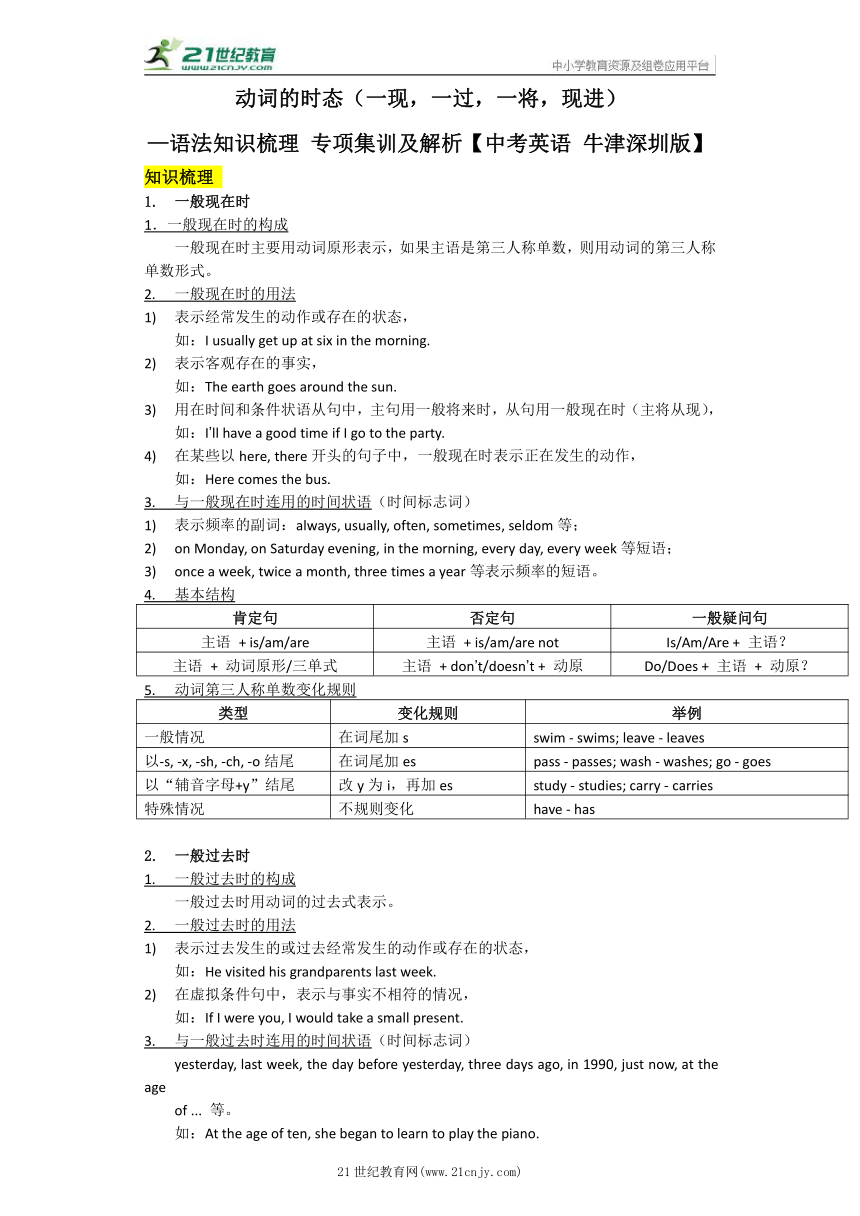 | |
| 格式 | docx | ||
| 文件大小 | 46.0KB | ||
| 资源类型 | 试卷 | ||
| 版本资源 | 牛津深圳版 | ||
| 科目 | 英语 | ||
| 更新时间 | 2024-01-29 13:39:05 | ||
图片预览

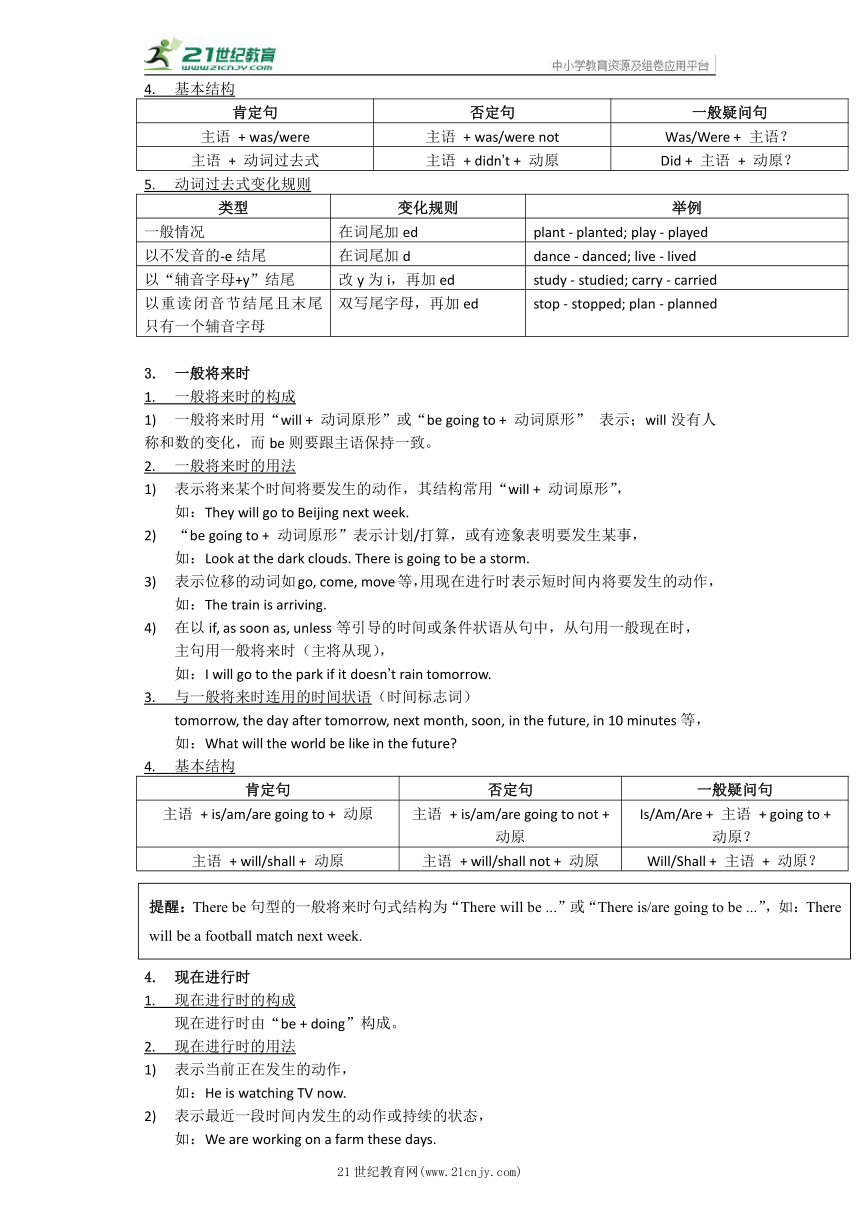
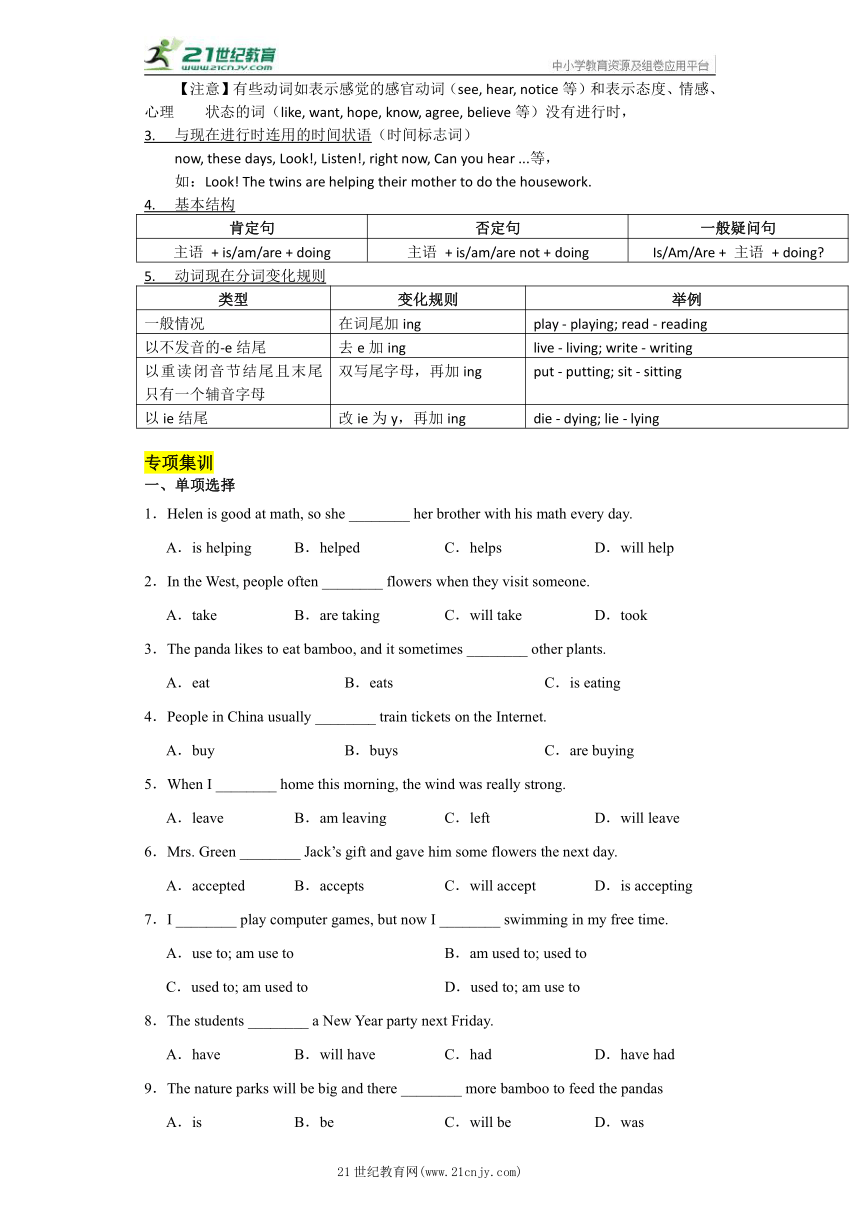
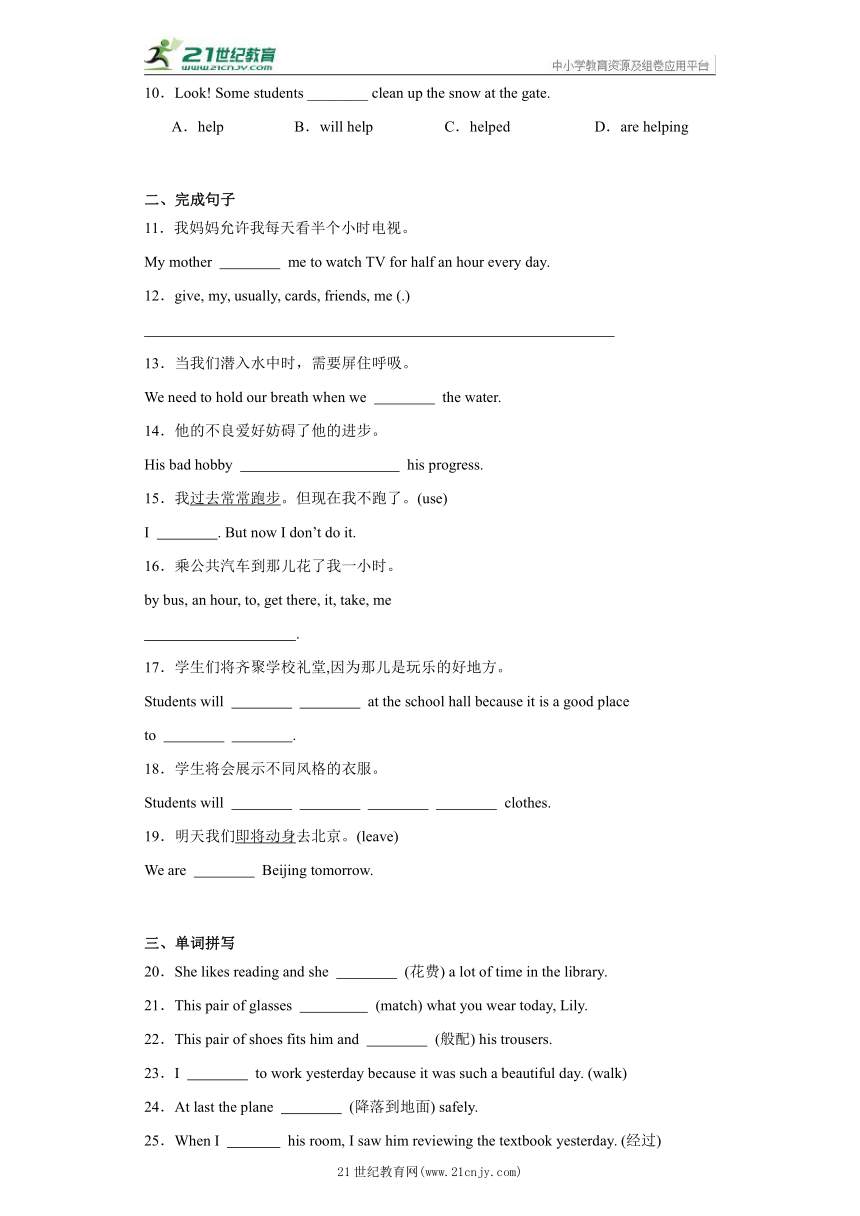
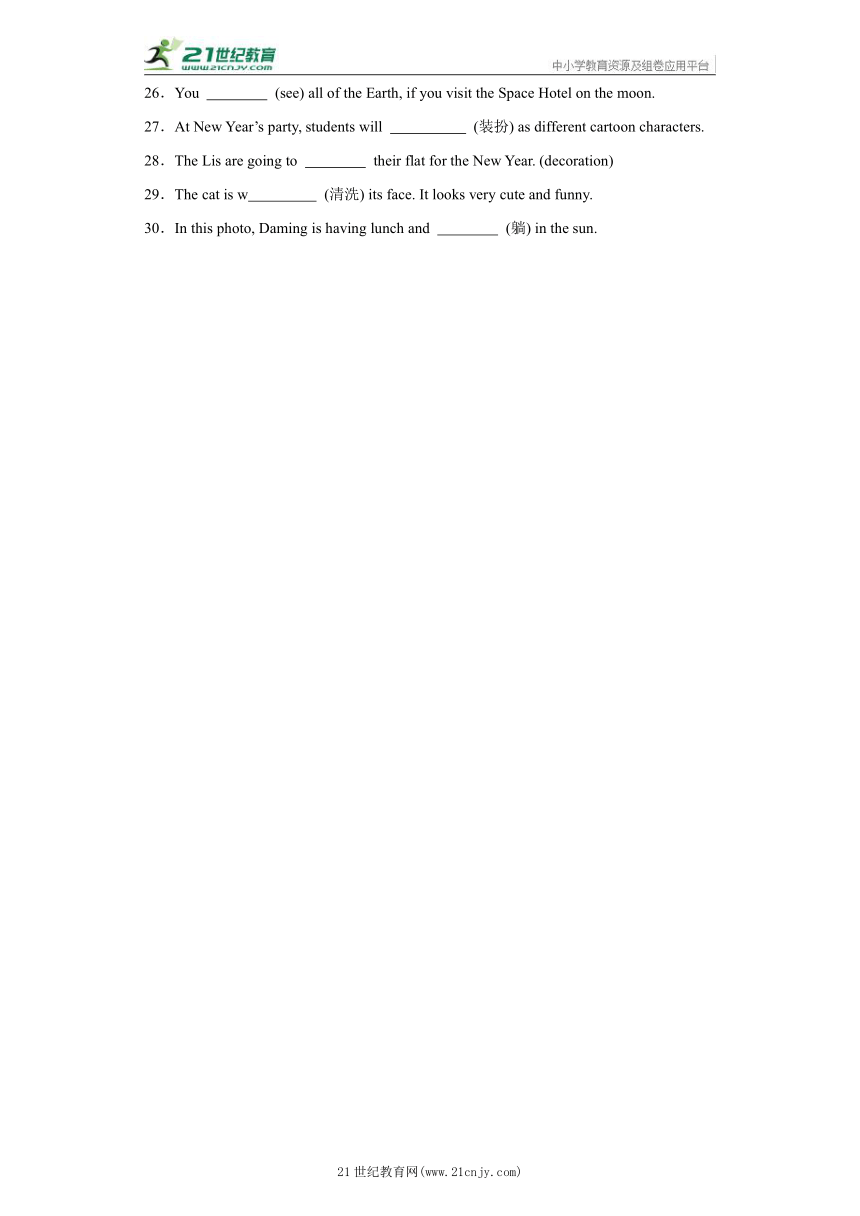
文档简介
动词的时态(一现,一过,一将,现进)
—语法知识梳理 专项集训及解析【中考英语 牛津深圳版】
知识梳理
1. 一般现在时
1.一般现在时的构成
一般现在时主要用动词原形表示,如果主语是第三人称单数,则用动词的第三人称单数形式。
2. 一般现在时的用法
1) 表示经常发生的动作或存在的状态,
如:I usually get up at six in the morning.
2) 表示客观存在的事实,
如:The earth goes around the sun.
3) 用在时间和条件状语从句中,主句用一般将来时,从句用一般现在时(主将从现),
如:I’ll have a good time if I go to the party.
4) 在某些以here, there开头的句子中,一般现在时表示正在发生的动作,
如:Here comes the bus.
3. 与一般现在时连用的时间状语(时间标志词)
1) 表示频率的副词:always, usually, often, sometimes, seldom等;
2) on Monday, on Saturday evening, in the morning, every day, every week等短语;
3) once a week, twice a month, three times a year等表示频率的短语。
4. 基本结构
肯定句 否定句 一般疑问句
主语 + is/am/are 主语 + is/am/are not Is/Am/Are + 主语?
主语 + 动词原形/三单式 主语 + don’t/doesn’t + 动原 Do/Does + 主语 + 动原?
5. 动词第三人称单数变化规则
类型 变化规则 举例
一般情况 在词尾加s swim - swims; leave - leaves
以-s, -x, -sh, -ch, -o结尾 在词尾加es pass - passes; wash - washes; go - goes
以“辅音字母+y”结尾 改y为i,再加es study - studies; carry - carries
特殊情况 不规则变化 have - has
2. 一般过去时
1. 一般过去时的构成
一般过去时用动词的过去式表示。
2. 一般过去时的用法
1) 表示过去发生的或过去经常发生的动作或存在的状态,
如:He visited his grandparents last week.
2) 在虚拟条件句中,表示与事实不相符的情况,
如:If I were you, I would take a small present.
3. 与一般过去时连用的时间状语(时间标志词)
yesterday, last week, the day before yesterday, three days ago, in 1990, just now, at the age
of ... 等。
如:At the age of ten, she began to learn to play the piano.
4. 基本结构
肯定句 否定句 一般疑问句
主语 + was/were 主语 + was/were not Was/Were + 主语?
主语 + 动词过去式 主语 + didn’t + 动原 Did + 主语 + 动原?
5. 动词过去式变化规则
类型 变化规则 举例
一般情况 在词尾加ed plant - planted; play - played
以不发音的-e结尾 在词尾加d dance - danced; live - lived
以“辅音字母+y”结尾 改y为i,再加ed study - studied; carry - carried
以重读闭音节结尾且末尾只有一个辅音字母 双写尾字母,再加ed stop - stopped; plan - planned
3. 一般将来时
1. 一般将来时的构成
1) 一般将来时用“will + 动词原形”或“be going to + 动词原形” 表示;will没有人称和数的变化,而be则要跟主语保持一致。
2. 一般将来时的用法
1) 表示将来某个时间将要发生的动作,其结构常用“will + 动词原形”,
如:They will go to Beijing next week.
2) “be going to + 动词原形”表示计划/打算,或有迹象表明要发生某事,
如:Look at the dark clouds. There is going to be a storm.
3) 表示位移的动词如go, come, move等,用现在进行时表示短时间内将要发生的动作,
如:The train is arriving.
4) 在以if, as soon as, unless等引导的时间或条件状语从句中,从句用一般现在时,
主句用一般将来时(主将从现),
如:I will go to the park if it doesn’t rain tomorrow.
3. 与一般将来时连用的时间状语(时间标志词)
tomorrow, the day after tomorrow, next month, soon, in the future, in 10 minutes等,
如:What will the world be like in the future
4. 基本结构
肯定句 否定句 一般疑问句
主语 + is/am/are going to + 动原 主语 + is/am/are going to not + 动原 Is/Am/Are + 主语 + going to + 动原?
主语 + will/shall + 动原 主语 + will/shall not + 动原 Will/Shall + 主语 + 动原?
4. 现在进行时
1. 现在进行时的构成
现在进行时由“be + doing”构成。
2. 现在进行时的用法
1) 表示当前正在发生的动作,
如:He is watching TV now.
2) 表示最近一段时间内发生的动作或持续的状态,
如:We are working on a farm these days.
【注意】有些动词如表示感觉的感官动词(see, hear, notice等)和表示态度、情感、心理 状态的词(like, want, hope, know, agree, believe等)没有进行时,
3. 与现在进行时连用的时间状语(时间标志词)
now, these days, Look!, Listen!, right now, Can you hear ...等,
如:Look! The twins are helping their mother to do the housework.
4. 基本结构
肯定句 否定句 一般疑问句
主语 + is/am/are + doing 主语 + is/am/are not + doing Is/Am/Are + 主语 + doing
5. 动词现在分词变化规则
类型 变化规则 举例
一般情况 在词尾加ing play - playing; read - reading
以不发音的-e结尾 去e加ing live - living; write - writing
以重读闭音节结尾且末尾只有一个辅音字母 双写尾字母,再加ing put - putting; sit - sitting
以ie结尾 改ie为y,再加ing die - dying; lie - lying
专项集训
一、单项选择
1.Helen is good at math, so she ________ her brother with his math every day.
A.is helping B.helped C.helps D.will help
2.In the West, people often ________ flowers when they visit someone.
A.take B.are taking C.will take D.took
3.The panda likes to eat bamboo, and it sometimes ________ other plants.
A.eat B.eats C.is eating
4.People in China usually ________ train tickets on the Internet.
A.buy B.buys C.are buying
5.When I ________ home this morning, the wind was really strong.
A.leave B.am leaving C.left D.will leave
6.Mrs. Green ________ Jack’s gift and gave him some flowers the next day.
A.accepted B.accepts C.will accept D.is accepting
7.I ________ play computer games, but now I ________ swimming in my free time.
A.use to; am use to B.am used to; used to
C.used to; am used to D.used to; am use to
8.The students ________ a New Year party next Friday.
A.have B.will have C.had D.have had
9.The nature parks will be big and there ________ more bamboo to feed the pandas
A.is B.be C.will be D.was
10.Look! Some students ________ clean up the snow at the gate.
A.help B.will help C.helped D.are helping
二、完成句子
11.我妈妈允许我每天看半个小时电视。
My mother me to watch TV for half an hour every day.
12.give, my, usually, cards, friends, me (.)
13.当我们潜入水中时,需要屏住呼吸。
We need to hold our breath when we the water.
14.他的不良爱好妨碍了他的进步。
His bad hobby his progress.
15.我过去常常跑步。但现在我不跑了。(use)
I . But now I don’t do it.
16.乘公共汽车到那儿花了我一小时。
by bus, an hour, to, get there, it, take, me
.
17.学生们将齐聚学校礼堂,因为那儿是玩乐的好地方。
Students will at the school hall because it is a good place to .
18.学生将会展示不同风格的衣服。
Students will clothes.
19.明天我们即将动身去北京。(leave)
We are Beijing tomorrow.
三、单词拼写
20.She likes reading and she (花费) a lot of time in the library.
21.This pair of glasses (match) what you wear today, Lily.
22.This pair of shoes fits him and (般配) his trousers.
23.I to work yesterday because it was such a beautiful day. (walk)
24.At last the plane (降落到地面) safely.
25.When I his room, I saw him reviewing the textbook yesterday. (经过)
26.You (see) all of the Earth, if you visit the Space Hotel on the moon.
27.At New Year’s party, students will (装扮) as different cartoon characters.
28.The Lis are going to their flat for the New Year. (decoration)
29.The cat is w (清洗) its face. It looks very cute and funny.
30.In this photo, Daming is having lunch and (躺) in the sun.
21世纪教育网(www.21cnjy.com)
21世纪教育网(www.21cnjy.com)
参考答案:
1.C
【详解】句意:海伦数学很好,所以她每天都帮助她哥哥学习数学。
考查一般现在时。根据“every day”可知,时态是一般现在时,主语she表示单数,动词help要变成第三人称单数形式helps,故选C。
2.A
【详解】句意:在西方,人们拜访别人时经常带花。
考查动词时态。根据“often”可知,该句陈述经常性的动作,且句中没有表示过去的词,故用一般现在时。故选A。
3.B
【详解】句意:熊猫喜欢吃竹子,有时还会吃其他植物。
考查时态。根据“The panda likes to eat bamboo, and it sometimes...”可知,本句时态为一般现在时,主语it为第三人称单数,所以动词用三单形式。故选B。
4.A
【详解】句意:中国人通常在网上买火车票。
考查主谓一致。本句时态为一般现在时,主语为集体名词people,谓语动词用原形。故选A。
5.C
【详解】句意:今天早上我离开家的时候,风真的很大。
考查动词时态。根据“this morning, the wind was really strong.”可知该句是一般过去时,谓语动词应使用动词过去式,leave的过去式是left。故选C。
6.A
【详解】句意:格林夫人接受了杰克的礼物,第二天送给他一些花。
考查时态。根据“gave”判断时态为一般过去时,动词应用过去式。故选A。
7.C
【详解】句意:我过去常玩电脑游戏,但现在我习惯了在空闲时间游泳。
考查动词短语。used to do过去常常做某事;be used to doing习惯做某事;use to和be use to表达错误。根据“I ... play computer games, but now I ... swimming in my free time.”可知,过去常玩电脑游戏,但现在习惯游泳。故选C。
8.B
【详解】句意:学生们下周五将有一个新年晚会。
考查一般将来时态。题干的“next Friday”是一般将来时态的时间状语;一般将来时态的结构为:will+动词原形,应填will have。故选B。
9.C
【详解】句意:自然公园将很大,将会有更多的竹子来喂养熊猫。
考查动词时态。根据“The nature parks will be big”及语境可知,事情还未发生,时态用一般将来时(will do),故选C。
10.D
【详解】句意:看!一些学生正在帮忙清理门口的积雪。
考查动词时态。根据“Look!”可知,此处表示此刻正发生的事情,应用现在进行时am/is/are doing,主语是复数,be用are。故选D。
11.allows
【详解】allow sb to do sth“允许某人做某事”,时态是一般现在时,主语是第三人称单数,动词用三单。故填allows。
12.My friends usually give me cards
【详解】根据所给标点可知,本句是一个陈述句;分析所给单词,my friends“我的朋友”做主语;give“给”是谓语动词;usually是频度副词,放在实义动词之前;根据give sb. sth.“给某人某物”可知,直接宾语为me,间接宾语为cards“卡片”。故填My friends usually give me cards“我的朋友通常给我贺卡”。
13.dive into
【详解】根据中英文对照可知,空处缺少“潜入”,其对应的英文表达是dive into。此处是一般现在时,主语we是复数,动词用原形。故填dive into。
14.got in the way of/was in the way of
【详解】“妨碍”get/be in the way of,固定短语;根据汉语可知,本句时态是一般过去时,所以谓语动词用过去式,主语是His bad hobby,be动词用was。故填got in the way of;was in the way of。
15.used to run
【详解】根据中英文对照可知,空处应填意为“过去常常跑步”的英文表达,used to do sth“过去常常做某事”,run“跑步”。故填used to run。
16.It took me an hour to get there by bus
【详解】根据中文提示及所给词汇可知,本句应用句型“It takes sb.+时间+ to do sth.”意为“某人花费时间做某事”,时态为一般过去时,所以动词take用过去式took。it作形式主语,首字母大写;took作谓语;to get there by bus作真正主语。故填It took me an hour to get there by bus“乘公共汽车到那儿花了我一小时”。
17. get together have fun
【详解】“齐聚”是动词短语get together;“玩乐”是动词短语have fun。will后加动词原形,根据“it is a good place to”可知此处是动词不定式to have fun作定语修饰名词place。故填get;together;have;fun。
18. show different styles of
【详解】“展示”show,will后跟动词原形;“不同风格的”different styles of,故填show;different;styles;of。
19.leaving for
【详解】leave for“动身去”,leave是瞬间动词,因此空处用现在进行时表将来,其构成为be doing。故填leaving for。
20.spends
【详解】句意:她喜欢读书,她每年花很多时间在图书馆。由句意和语境可推测,本题考查spend time“花费时间”,又因为and连接的两个句子时态一致,前一句是一般现在时,故后一句应该用一般现在时,主语是she,应填动词的三单形式。故填spends。
21.matches
【详解】句意:这副眼镜和你今天的穿着很相配,莉莉。句中缺少谓语动词,句子是一般现在时,This pair of glasses“这副眼镜”作主语,为单数,故谓语动词应该用其三单式matches。故填matches。
22.matches
【详解】句意:这双鞋很适合他,和他的裤子很相配。“般配”的英文表达是match,动词。and连接两个并列成分,and前的fits是动词fit的第三人称单数形式,所以空格处填match的第三人称单数形式。故填matches。
23.walked
【详解】句意:我昨天步行去上班了,因为它是那么美好的一天。walk“步行”,动词;根据“yesterday”可知,表述的是过去发生的事情,谓语动词用过去式。故填walked。
24.landed
【详解】句意:最后飞机安全着陆了。land“着陆,降落到地面”,根据句意可判断此句用一般过去时,动词用过去式,故填landed。
25.went by
【详解】句意:昨天我经过他的房间时,看到他在复习课本。go by“经过”。根据yesterday可知,该句为一般过去时。故填went by。
26.will see/can see
【详解】句意:如果你去月球上的太空旅馆,你会/可以看到整个地球。if引导的条件状语从句,遵循“主将从现”或“主情从现”,从句表示“可以看到整个地球”,情态动词用can,后接动词原形,一般将来时用will do的结构,故填will see/can see。
27.dress up
【详解】句意:在新年晚会上,学生们将装扮成不同的卡通人物。dress up“装扮”,动词短语。根据“At New Year’s party, students will...”可知,本句时态为一般将来时“will do”结构,所以动词应用原形。故填dress up。
28.decorate
【详解】句意:姓李的夫妇将为新年装饰他们的公寓。be going to do“将做什么”,所给词decoration意思是“装饰”,名词。横线上应是动词,所以变为decorate。故填decorate。
29.(w)ashing
【详解】句意:小猫在洗脸。它看起来很可爱,很有趣。wash表示“洗”,此空用动词现在分词,与空前is构成现在进行时。故填(w)ashing。
30.lying
【详解】句意:在这张照片里,大明正在吃午饭,躺在阳光下。“躺”lie,and连接两个并列动词,结合having可知,空处也应用lie的现在分词,故填lying。
21世纪教育网(www.21cnjy.com)
21世纪教育网(www.21cnjy.com)
—语法知识梳理 专项集训及解析【中考英语 牛津深圳版】
知识梳理
1. 一般现在时
1.一般现在时的构成
一般现在时主要用动词原形表示,如果主语是第三人称单数,则用动词的第三人称单数形式。
2. 一般现在时的用法
1) 表示经常发生的动作或存在的状态,
如:I usually get up at six in the morning.
2) 表示客观存在的事实,
如:The earth goes around the sun.
3) 用在时间和条件状语从句中,主句用一般将来时,从句用一般现在时(主将从现),
如:I’ll have a good time if I go to the party.
4) 在某些以here, there开头的句子中,一般现在时表示正在发生的动作,
如:Here comes the bus.
3. 与一般现在时连用的时间状语(时间标志词)
1) 表示频率的副词:always, usually, often, sometimes, seldom等;
2) on Monday, on Saturday evening, in the morning, every day, every week等短语;
3) once a week, twice a month, three times a year等表示频率的短语。
4. 基本结构
肯定句 否定句 一般疑问句
主语 + is/am/are 主语 + is/am/are not Is/Am/Are + 主语?
主语 + 动词原形/三单式 主语 + don’t/doesn’t + 动原 Do/Does + 主语 + 动原?
5. 动词第三人称单数变化规则
类型 变化规则 举例
一般情况 在词尾加s swim - swims; leave - leaves
以-s, -x, -sh, -ch, -o结尾 在词尾加es pass - passes; wash - washes; go - goes
以“辅音字母+y”结尾 改y为i,再加es study - studies; carry - carries
特殊情况 不规则变化 have - has
2. 一般过去时
1. 一般过去时的构成
一般过去时用动词的过去式表示。
2. 一般过去时的用法
1) 表示过去发生的或过去经常发生的动作或存在的状态,
如:He visited his grandparents last week.
2) 在虚拟条件句中,表示与事实不相符的情况,
如:If I were you, I would take a small present.
3. 与一般过去时连用的时间状语(时间标志词)
yesterday, last week, the day before yesterday, three days ago, in 1990, just now, at the age
of ... 等。
如:At the age of ten, she began to learn to play the piano.
4. 基本结构
肯定句 否定句 一般疑问句
主语 + was/were 主语 + was/were not Was/Were + 主语?
主语 + 动词过去式 主语 + didn’t + 动原 Did + 主语 + 动原?
5. 动词过去式变化规则
类型 变化规则 举例
一般情况 在词尾加ed plant - planted; play - played
以不发音的-e结尾 在词尾加d dance - danced; live - lived
以“辅音字母+y”结尾 改y为i,再加ed study - studied; carry - carried
以重读闭音节结尾且末尾只有一个辅音字母 双写尾字母,再加ed stop - stopped; plan - planned
3. 一般将来时
1. 一般将来时的构成
1) 一般将来时用“will + 动词原形”或“be going to + 动词原形” 表示;will没有人称和数的变化,而be则要跟主语保持一致。
2. 一般将来时的用法
1) 表示将来某个时间将要发生的动作,其结构常用“will + 动词原形”,
如:They will go to Beijing next week.
2) “be going to + 动词原形”表示计划/打算,或有迹象表明要发生某事,
如:Look at the dark clouds. There is going to be a storm.
3) 表示位移的动词如go, come, move等,用现在进行时表示短时间内将要发生的动作,
如:The train is arriving.
4) 在以if, as soon as, unless等引导的时间或条件状语从句中,从句用一般现在时,
主句用一般将来时(主将从现),
如:I will go to the park if it doesn’t rain tomorrow.
3. 与一般将来时连用的时间状语(时间标志词)
tomorrow, the day after tomorrow, next month, soon, in the future, in 10 minutes等,
如:What will the world be like in the future
4. 基本结构
肯定句 否定句 一般疑问句
主语 + is/am/are going to + 动原 主语 + is/am/are going to not + 动原 Is/Am/Are + 主语 + going to + 动原?
主语 + will/shall + 动原 主语 + will/shall not + 动原 Will/Shall + 主语 + 动原?
4. 现在进行时
1. 现在进行时的构成
现在进行时由“be + doing”构成。
2. 现在进行时的用法
1) 表示当前正在发生的动作,
如:He is watching TV now.
2) 表示最近一段时间内发生的动作或持续的状态,
如:We are working on a farm these days.
【注意】有些动词如表示感觉的感官动词(see, hear, notice等)和表示态度、情感、心理 状态的词(like, want, hope, know, agree, believe等)没有进行时,
3. 与现在进行时连用的时间状语(时间标志词)
now, these days, Look!, Listen!, right now, Can you hear ...等,
如:Look! The twins are helping their mother to do the housework.
4. 基本结构
肯定句 否定句 一般疑问句
主语 + is/am/are + doing 主语 + is/am/are not + doing Is/Am/Are + 主语 + doing
5. 动词现在分词变化规则
类型 变化规则 举例
一般情况 在词尾加ing play - playing; read - reading
以不发音的-e结尾 去e加ing live - living; write - writing
以重读闭音节结尾且末尾只有一个辅音字母 双写尾字母,再加ing put - putting; sit - sitting
以ie结尾 改ie为y,再加ing die - dying; lie - lying
专项集训
一、单项选择
1.Helen is good at math, so she ________ her brother with his math every day.
A.is helping B.helped C.helps D.will help
2.In the West, people often ________ flowers when they visit someone.
A.take B.are taking C.will take D.took
3.The panda likes to eat bamboo, and it sometimes ________ other plants.
A.eat B.eats C.is eating
4.People in China usually ________ train tickets on the Internet.
A.buy B.buys C.are buying
5.When I ________ home this morning, the wind was really strong.
A.leave B.am leaving C.left D.will leave
6.Mrs. Green ________ Jack’s gift and gave him some flowers the next day.
A.accepted B.accepts C.will accept D.is accepting
7.I ________ play computer games, but now I ________ swimming in my free time.
A.use to; am use to B.am used to; used to
C.used to; am used to D.used to; am use to
8.The students ________ a New Year party next Friday.
A.have B.will have C.had D.have had
9.The nature parks will be big and there ________ more bamboo to feed the pandas
A.is B.be C.will be D.was
10.Look! Some students ________ clean up the snow at the gate.
A.help B.will help C.helped D.are helping
二、完成句子
11.我妈妈允许我每天看半个小时电视。
My mother me to watch TV for half an hour every day.
12.give, my, usually, cards, friends, me (.)
13.当我们潜入水中时,需要屏住呼吸。
We need to hold our breath when we the water.
14.他的不良爱好妨碍了他的进步。
His bad hobby his progress.
15.我过去常常跑步。但现在我不跑了。(use)
I . But now I don’t do it.
16.乘公共汽车到那儿花了我一小时。
by bus, an hour, to, get there, it, take, me
.
17.学生们将齐聚学校礼堂,因为那儿是玩乐的好地方。
Students will at the school hall because it is a good place to .
18.学生将会展示不同风格的衣服。
Students will clothes.
19.明天我们即将动身去北京。(leave)
We are Beijing tomorrow.
三、单词拼写
20.She likes reading and she (花费) a lot of time in the library.
21.This pair of glasses (match) what you wear today, Lily.
22.This pair of shoes fits him and (般配) his trousers.
23.I to work yesterday because it was such a beautiful day. (walk)
24.At last the plane (降落到地面) safely.
25.When I his room, I saw him reviewing the textbook yesterday. (经过)
26.You (see) all of the Earth, if you visit the Space Hotel on the moon.
27.At New Year’s party, students will (装扮) as different cartoon characters.
28.The Lis are going to their flat for the New Year. (decoration)
29.The cat is w (清洗) its face. It looks very cute and funny.
30.In this photo, Daming is having lunch and (躺) in the sun.
21世纪教育网(www.21cnjy.com)
21世纪教育网(www.21cnjy.com)
参考答案:
1.C
【详解】句意:海伦数学很好,所以她每天都帮助她哥哥学习数学。
考查一般现在时。根据“every day”可知,时态是一般现在时,主语she表示单数,动词help要变成第三人称单数形式helps,故选C。
2.A
【详解】句意:在西方,人们拜访别人时经常带花。
考查动词时态。根据“often”可知,该句陈述经常性的动作,且句中没有表示过去的词,故用一般现在时。故选A。
3.B
【详解】句意:熊猫喜欢吃竹子,有时还会吃其他植物。
考查时态。根据“The panda likes to eat bamboo, and it sometimes...”可知,本句时态为一般现在时,主语it为第三人称单数,所以动词用三单形式。故选B。
4.A
【详解】句意:中国人通常在网上买火车票。
考查主谓一致。本句时态为一般现在时,主语为集体名词people,谓语动词用原形。故选A。
5.C
【详解】句意:今天早上我离开家的时候,风真的很大。
考查动词时态。根据“this morning, the wind was really strong.”可知该句是一般过去时,谓语动词应使用动词过去式,leave的过去式是left。故选C。
6.A
【详解】句意:格林夫人接受了杰克的礼物,第二天送给他一些花。
考查时态。根据“gave”判断时态为一般过去时,动词应用过去式。故选A。
7.C
【详解】句意:我过去常玩电脑游戏,但现在我习惯了在空闲时间游泳。
考查动词短语。used to do过去常常做某事;be used to doing习惯做某事;use to和be use to表达错误。根据“I ... play computer games, but now I ... swimming in my free time.”可知,过去常玩电脑游戏,但现在习惯游泳。故选C。
8.B
【详解】句意:学生们下周五将有一个新年晚会。
考查一般将来时态。题干的“next Friday”是一般将来时态的时间状语;一般将来时态的结构为:will+动词原形,应填will have。故选B。
9.C
【详解】句意:自然公园将很大,将会有更多的竹子来喂养熊猫。
考查动词时态。根据“The nature parks will be big”及语境可知,事情还未发生,时态用一般将来时(will do),故选C。
10.D
【详解】句意:看!一些学生正在帮忙清理门口的积雪。
考查动词时态。根据“Look!”可知,此处表示此刻正发生的事情,应用现在进行时am/is/are doing,主语是复数,be用are。故选D。
11.allows
【详解】allow sb to do sth“允许某人做某事”,时态是一般现在时,主语是第三人称单数,动词用三单。故填allows。
12.My friends usually give me cards
【详解】根据所给标点可知,本句是一个陈述句;分析所给单词,my friends“我的朋友”做主语;give“给”是谓语动词;usually是频度副词,放在实义动词之前;根据give sb. sth.“给某人某物”可知,直接宾语为me,间接宾语为cards“卡片”。故填My friends usually give me cards“我的朋友通常给我贺卡”。
13.dive into
【详解】根据中英文对照可知,空处缺少“潜入”,其对应的英文表达是dive into。此处是一般现在时,主语we是复数,动词用原形。故填dive into。
14.got in the way of/was in the way of
【详解】“妨碍”get/be in the way of,固定短语;根据汉语可知,本句时态是一般过去时,所以谓语动词用过去式,主语是His bad hobby,be动词用was。故填got in the way of;was in the way of。
15.used to run
【详解】根据中英文对照可知,空处应填意为“过去常常跑步”的英文表达,used to do sth“过去常常做某事”,run“跑步”。故填used to run。
16.It took me an hour to get there by bus
【详解】根据中文提示及所给词汇可知,本句应用句型“It takes sb.+时间+ to do sth.”意为“某人花费时间做某事”,时态为一般过去时,所以动词take用过去式took。it作形式主语,首字母大写;took作谓语;to get there by bus作真正主语。故填It took me an hour to get there by bus“乘公共汽车到那儿花了我一小时”。
17. get together have fun
【详解】“齐聚”是动词短语get together;“玩乐”是动词短语have fun。will后加动词原形,根据“it is a good place to”可知此处是动词不定式to have fun作定语修饰名词place。故填get;together;have;fun。
18. show different styles of
【详解】“展示”show,will后跟动词原形;“不同风格的”different styles of,故填show;different;styles;of。
19.leaving for
【详解】leave for“动身去”,leave是瞬间动词,因此空处用现在进行时表将来,其构成为be doing。故填leaving for。
20.spends
【详解】句意:她喜欢读书,她每年花很多时间在图书馆。由句意和语境可推测,本题考查spend time“花费时间”,又因为and连接的两个句子时态一致,前一句是一般现在时,故后一句应该用一般现在时,主语是she,应填动词的三单形式。故填spends。
21.matches
【详解】句意:这副眼镜和你今天的穿着很相配,莉莉。句中缺少谓语动词,句子是一般现在时,This pair of glasses“这副眼镜”作主语,为单数,故谓语动词应该用其三单式matches。故填matches。
22.matches
【详解】句意:这双鞋很适合他,和他的裤子很相配。“般配”的英文表达是match,动词。and连接两个并列成分,and前的fits是动词fit的第三人称单数形式,所以空格处填match的第三人称单数形式。故填matches。
23.walked
【详解】句意:我昨天步行去上班了,因为它是那么美好的一天。walk“步行”,动词;根据“yesterday”可知,表述的是过去发生的事情,谓语动词用过去式。故填walked。
24.landed
【详解】句意:最后飞机安全着陆了。land“着陆,降落到地面”,根据句意可判断此句用一般过去时,动词用过去式,故填landed。
25.went by
【详解】句意:昨天我经过他的房间时,看到他在复习课本。go by“经过”。根据yesterday可知,该句为一般过去时。故填went by。
26.will see/can see
【详解】句意:如果你去月球上的太空旅馆,你会/可以看到整个地球。if引导的条件状语从句,遵循“主将从现”或“主情从现”,从句表示“可以看到整个地球”,情态动词用can,后接动词原形,一般将来时用will do的结构,故填will see/can see。
27.dress up
【详解】句意:在新年晚会上,学生们将装扮成不同的卡通人物。dress up“装扮”,动词短语。根据“At New Year’s party, students will...”可知,本句时态为一般将来时“will do”结构,所以动词应用原形。故填dress up。
28.decorate
【详解】句意:姓李的夫妇将为新年装饰他们的公寓。be going to do“将做什么”,所给词decoration意思是“装饰”,名词。横线上应是动词,所以变为decorate。故填decorate。
29.(w)ashing
【详解】句意:小猫在洗脸。它看起来很可爱,很有趣。wash表示“洗”,此空用动词现在分词,与空前is构成现在进行时。故填(w)ashing。
30.lying
【详解】句意:在这张照片里,大明正在吃午饭,躺在阳光下。“躺”lie,and连接两个并列动词,结合having可知,空处也应用lie的现在分词,故填lying。
21世纪教育网(www.21cnjy.com)
21世纪教育网(www.21cnjy.com)
同课章节目录
- 词法
- 名词
- 动词和动词短语
- 动词语态
- 动词时态
- 助动词和情态动词
- 非谓语动词
- 冠词
- 代词
- 数词和量词
- 形容词副词及其比较等级
- 介词和介词短语
- 连词和感叹词
- 构词法
- 相似、相近词比较
- 句法
- 陈述句
- 一般疑问句和否定疑问句
- 特殊疑问句及选择疑问句
- 反意疑问句
- 存在句(There be句型)
- 宾语从句
- 定语从句
- 状语从句
- 主谓一致问题
- 简单句
- 并列句
- 复合句
- 主谓一致
- 主、表语从句
- 名词性从句
- 直接引语和间接引语
- 虚拟语气
- 感叹句
- 强调句
- 倒装句
- 祈使句
- 句子的成分
- 句子的分类
- 题型专区
- 单项选择部分
- 易错题
- 完形填空
- 阅读理解
- 词汇练习
- 听说训练
- 句型转换
- 补全对话
- 短文改错
- 翻译
- 书面表达
- 任务型阅读
- 语法填空
- 其他资料
